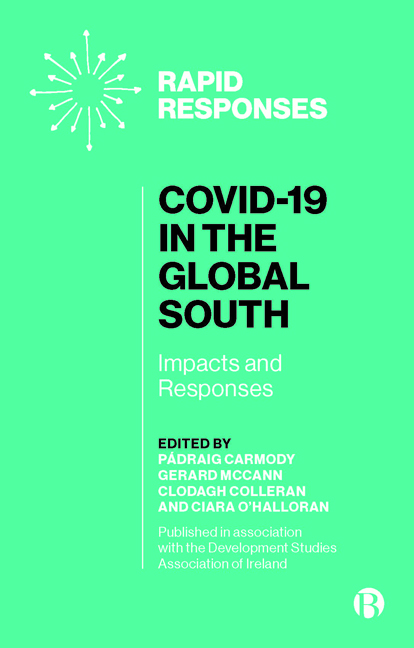Introduction
Published online by Cambridge University Press: 23 March 2021
Summary
The world has been convulsed by the COVID-19 (coronavirus disease 2019) pandemic. The virus has caused untold misery both directly and indirectly to people around the world and its effect on societies and economies globally has been catastrophic. International travel has ground to a near halt, the global economy has stalled and many countries around the world are in government-enforced ‘lockdowns’. Numerous countries have entered deep recessions and many global value chains have experienced massive disruption as a result of both demand, and in some cases, supply shocks, sending reverberations through the value chains of suppliers with negative multiplier and accelerator effects. Such economic shocks are largely an outcome of government policy responses to the pandemic and will have cascading effects both socially and economically for many years to come (OECD, 2020). Notwithstanding the billions of lives that have been adversely affected and the hundreds of thousands of deaths resulting from it, the pandemic has also exposed further serious flaws in the architecture of international development.
In the Global North, the purpose of lockdowns has been to slow the spread of the disease and prevent healthcare systems from being overwhelmed. The countries of the Global South appear to be affected differently, although this is changing as the geographic epicentres of the disease shift. In the developing world, lockdowns were put in place quickly, with often severe livelihood consequences given high levels of dependence on the informal sector for survival, and the general absence of widespread health, social security and public policy assistance measures. Thus, the ‘secondary effects’ of the crisis are more evident in the Global South, although many countries, as of mid-2020, have now lifted their lockdowns. These countries are also particularly vulnerable to systemic, structural effects (Hulme and Horner, 2020) and their amplification through interaction with wider contradictions and tendencies.
Proponents of unregulated global economic integration argue that this model is universally beneficial for all market participants. However, COVID-19, along with the previous ‘global’ financial crisis and the coming climate one exposes the contradictions and vulnerabilities of unmanaged interconnection. In a sense we can view connection as contradictory, temporally, as it generated economic growth, but is now associated with synchronized worldwide economic downturn – the most severe since the Great Depression. The contagion of COVID-19 was mirrored by the financial contagion in the first decade of the 21st century.
- Type
- Chapter
- Information
- COVID-19 in the Global SouthImpacts and Responses, pp. 1 - 4Publisher: Bristol University PressPrint publication year: 2020

